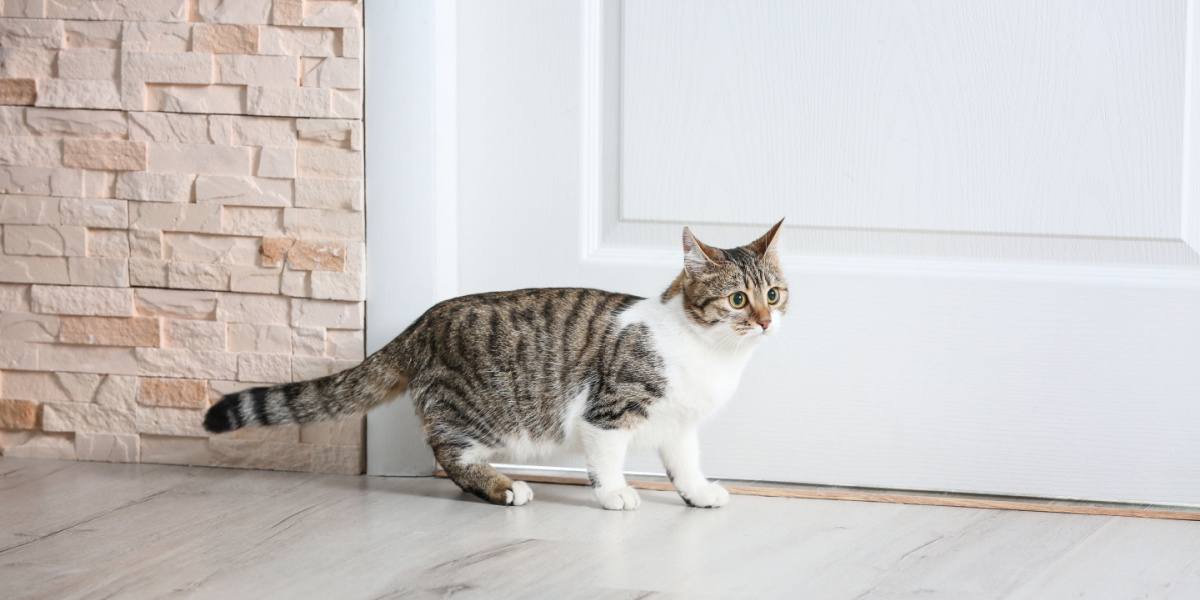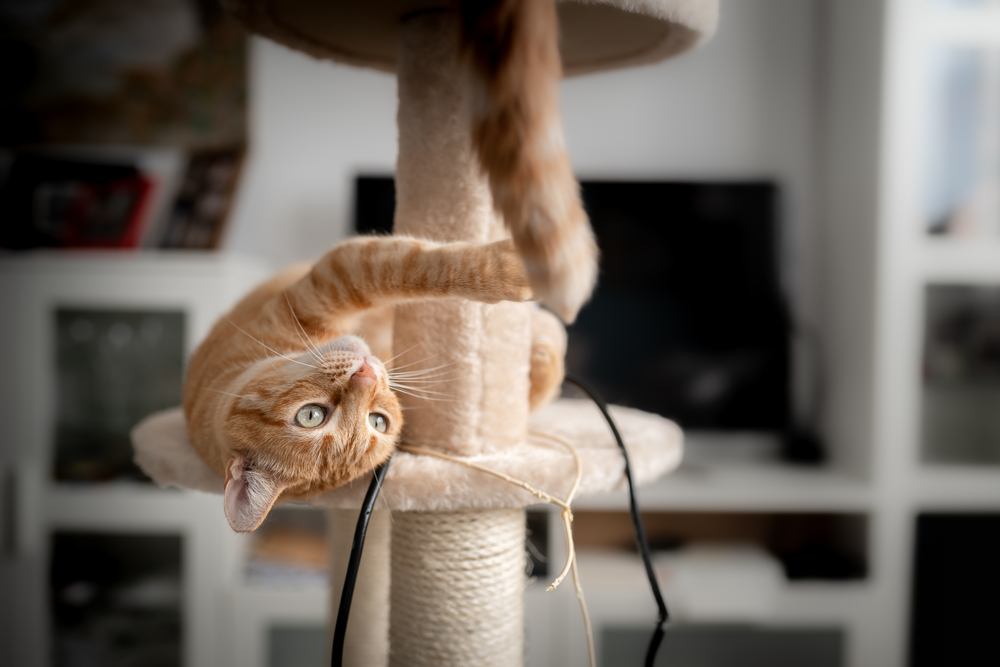Whether you have a spare bedroom you want to keep pristine, your partner is building a delicate LEGO masterpiece, or you have an older pet that needs some time away from your mischievous young cat, we all have times when we need to restrict our cat’s access to parts of the home.
It's possible to keep your cat out of a certain room if you consistently employ several techniques to restrict access. A combination of strategies, including physical barriers and gentle deterrents, might be required. Distract your cat from wanting to enter the room by making other areas of the home more appealing.Key Takeaways
Who knew preventing your cat from entering one room would prove so challenging? You’re not the first to face this problem. Here are our top 10 tips for keeping your cat out of one room of the house.
1. Close the Door
It sounds simple, but you can’t expect your cat to learn not to enter a space without physical barriers. This is particularly true if they believe there is a high-value resource in the room. Closing the door is step number one.
Monitor your cat’s reaction as they might not take no for an answer. Some cats are crafty and learn to open closed doors, so don’t underestimate your cat’s intelligence. Some people have to go as far as locking the door or making it a little trickier for their cat.
2. Other Physical Barriers
Depending on your cat’s age and agility levels, some people find baby gates or pet gates effective. Be careful with certain styles of baby gates, such as those with wide-spacing bars—you don’t want your cat getting stuck trying to squeeze through. Mesh gates can be safer if you have an older cat that is unlikely to climb. Extra-tall pet gates can work well in rooms where there is no door.
3. Create a Buffer Zone
Some cats persist scratching at a closed door, so creating more buffer space can be helpful.
If your cat is keeping you up at night, meowing and scratching at your bedroom door, you need a buffer zone. It is a simple principle—keep some distance between your cat and the door. If there is a hallway or another room that can also act as a cat-free zone and keep your cat a little farther away, you might find that they are less motivated to get into the room.
The hope is that your cat will eventually learn that they are not allowed in the room and will stop asking. This is also a great strategy for cats that like to dart past when we open a door—an extra level of protection to stop them from entering forbidden spaces.
4. Make Other Rooms More Appealing
The key to resolving the issue is determining why your cat is so motivated to enter the room. You need to think like a detective. Do they love that sunny window sill, want to curl up on a pillow with your scent, want a quiet escape from the rest of the house, or are they feeling hungry at night? Work out why your cat wants to enter that room in particular and try to recreate that environment elsewhere.
For example, if you are trying to keep cats from the kitchen when you cook, feed them elsewhere, and provide treats and toys in another part of the house as a distraction.
Offer high-value resources in another area of the home, including:
- Heat sources or a bed in the sunshine
- Catnip
- Cat toys
- Scratching posts
- Cat tree
- High perches
Give your cat plenty of fuss and cuddles at times when you are available. Cat pheromones and clothing that carries your scent can be particularly comforting when placed in a cat bed. However, if your cat develops separation anxiety, you must address this issue first.
Perhaps your cat is continually bothering you for food in the middle of the night. In that case, you might need to change their feeding regime, get a timed feeding device, or provide a diet that helps them feel more satiated.
If your cat is still begging for food at all hours, consider whether there might be a medical issue. Conditions such as hyperthyroidism will leave your cat famished and losing weight, no matter how much they eat, so speak to your veterinarian if you are unsure.
5. Eliminate Pet Odors
If your cat or another pet has previously used the forbidden room, there might be scents in there that are attracting your cat. Perhaps they are comforting, or your cat wants to return to reassert their territory.
Special enzymatic cleaners can effectively eliminate pet odors (including urine). But be sure to keep your pets away from any cleaning product while using them. Thoroughly clean the room, wash soft furnishings, and remove all pet-related items.
6. Make the Room Less Cat Friendly
Make the forbidden room less enticing by blocking hiding places and using smells cats dislike.
You’ve cleaned the room and set up cat-friendly spaces in the rest of your home, but you still need to make this room less appealing. If your cat were to get in, you need to show them that there are better places for a cat to spend their time! Block all hiding spaces, remove soft furnishings or cover them with something less comfortable, and remove any toys or food sources.
Some people suggest using smell or sound deterrents. Cats hate certain odors, so you can try homemade cat repellent using vinegar-soaked cotton inside a plastic box or jar with a perforated lid.
Alternatively, you can buy citrus scents in spray bottles to spritz over carpets. Ensure your cat has no contact with these products; they could cause sore eyes and stomach upset if you have an inquisitive cat.
Playing loud music inside the room might also disincentivize your cat from entering. But realistically, this is only a temporary measure, and you might get complaints from the neighbors. Also, loud music can lead to other stress-related issues for your cat, so it is best avoided.
7. Use Distractions
Distraction can be an excellent tool if you frequently need to enter a forbidden space. Small treats and toys elsewhere provide positive reinforcement that your cat is allowed in these spaces. The distraction will also buy you time to quickly nip through that door without having to out-sprint your cat.
Try to vary the distractions you provide, and don’t use too much food. You don’t want your cat to develop a weight issue due to your need to move around your home.
8. Stop Your Cat From Scratching
If your cat is desperately scratching at the door and destroying your shiny veneer, you can try some scratch deterrent tricks. Cats have an aversion to certain textures, and many pet parents have had great success covering doors with these materials to prevent scratching.
Aluminum foil strips or double-sided tape can be attached to the surface they are scratching and will act as a gentle deterrent. If you use a combination of methods, your cat will soon learn that there are better places for them to be. Remember, this is a temporary measure, and your house will not be covered in foil and sticky tape forever!
Cats do not respond favorably to direct negative enforcement; you should never yell at a cat. It will damage your bond, lead to fear and anxiety disorders, and simply won’t work. In fact, research shows that reprimanding your cat is not only ineffective, but it can also lead to an increase in undesirable behavior.
9. Be Consistent
To avoid confusing your cat, it’s best to make rooms either completely off limits or completely open.
Your cat will never learn to stay out of a room if you let them inside from time to time. You need to decide what is important. Is this a cat-free zone and no longer part of their territory, or are they allowed access whenever they like? A half-hearted approach is rarely successful and is confusing for your cat.
If you want your cat out of the bedroom at night, they need their own space to chill out in, too. Similarly, if the guest room is a no-go, find somewhere else for their quiet haven to hide away in when the house is loud and busy.
10. Cat Deterrents
We have touched on cat deterrents already, but they are controversial. You must take care not to cause unnecessary anxiety for your pet, and you should never try to hurt them or instill fear. Ultrasonic sound devices are designed for outside spaces and are triggered by a motion detector.
They produce high-frequency sound bursts designed to be inaudible to humans. However, some children appear to be affected by them. If other measures are not enough and you decide that this is something you want to try, ensure that the product you select is approved by cat welfare and wildlife organizations.
Other classic deterrents like squirting water, spraying compressed air, clapping hands or other loud noises, and loud music should be used with caution, and cats should be assessed individually. For nervous cats, deterrents like these might do more harm than good.
Final Thoughts
Keeping your cat out of a specific room in your home is no easy feat, and you might feel guilty, too. But have the courage of your convictions and try not to give your cat mixed signals, as this will worsen the issue.
In most situations, you will need many combined techniques to succeed. And you will need to stick to it for some time. Eventually, your cat will realize that there are far better places to hang out in your home and that they aren’t missing out on anything behind the forbidden door.
Related Conditions
- Cat Separation Anxiety: Causes, Symptoms, And Treatment
- Hyperthyroidism In Cats: Symptoms, Treatment & Causes
Frequently Asked Questions
Can you keep a cat out of one room?
Yes, you absolutely can. It can be tricky, and you might need to implement several strategies. You must also ensure that all household members follow the same rules. But don’t forget that your cat’s needs must be met. Provide lots of cat-friendly spaces and plenty of time to interact with the family or other pets, so they do not become lonely.
Think carefully about why you want the room to be cat-free. Cats are curious and like to explore their surroundings. Restricted access to parts of the house and deterrent strategies might cause frustration and anxiety, so only close off rooms that you really need to.
Is it cruel to lock my cat out of my bedroom?
Sometimes there is a very good reason to keep a cat out of the bedroom. Perhaps your cat wakes you throughout the night, or a family member is allergic to cats. You might have to make the best decision for the whole family, and sleep-deprived pet parents are not happy pet parents.
Making other areas of the house more appealing and giving your cat lots of affection during the day can work well. Check that you are not missing anything important, too. If your cat’s behavior at night has suddenly changed, try to figure out why. This will help you address the issue. If your cat struggles to adjust, sometimes an animal behaviorist can help.
-
Moesta A., Keys D., Crowell-Davis S. (2018). Survey of cat owners on features of, and preventative measures for, feline scratching of inappropriate objects: a pilot study. Journal of Feline Medicine and Surgery. 20(10), 891-899. Retrieved March 16, 2023
-
Cisneros A., Litwin D., Niel L., Stellato A.C. (2022). Unwanted Scratching Behavior in Cats: Influence of Management Strategies and Cat and Owner Characteristics. Animals. (Basel) 12(19), 2551. Retrieved March 16, 2023











